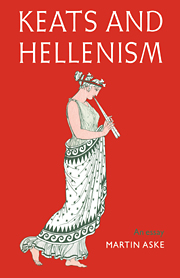Summary
A good deal has been written on the theme of Keats's Hellenism. For several reasons (the traditional prestige of classical mythology, Keats's obvious relation to Romantic Hellenism as a whole, our ample store of information about the texts at the poet's disposal) Keats's use of classical fictions has been a favourite area of occupation for literary historians. Much labour has been expended on tracing the classical imagery in, say, Endymion, or the ‘Ode on a Grecian Urn’, to a wealth of verbal and visual sources apparently available to the poet. While acknowledging the value of this kind of study, the following essay proposes a rather different approach for reading the representation of antiquity in Keats's poetry. Instead of assuming that the classical fictions are incontestably given and present in a specific poem (conveying a certain meaning determined by the context), this essay begins its argument at an earlier stage, so to speak, insofar as it explores the very difficulty and uncertainty of antiquity's representation in a modern text.
Poetic influence, says Geoffrey Hartman, is ‘personal, seductive, perverse, imposing’. The influence of classical antiquity on Keats plays itself out as a psychic drama in and between the lines of the Keatsian text, as a narrative which is both romance and elegy. Keats appeals to antiquity as a supreme fiction, that is, an ideal space of possibility whose imaginative rehabilitation might guarantee the authority of modern poetry.
- Type
- Chapter
- Information
- Keats and HellenismAn Essay, pp. 1 - 7Publisher: Cambridge University PressPrint publication year: 1985

